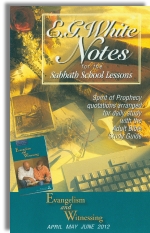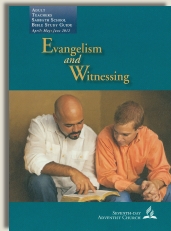|
||||||||||||||
Commentary on "Releasing Into Ministry"
Day 4: Tuesday, May 29, 2012 - Matching the Laborers With the Harvest
Summary
Today’s lesson states this premise for matching the witness with the inquirer: “In a multicultural society, we would do well to assign someone of the same nationality and language as the inquirer and possibly someone of a similar age group.”
The assumption here is that the greater the similarities between the witness and the person being witnessed to, the greater the effectiveness of that witness. The flip side of this idea is that we should discourage witnessing to people who are not like us. Is this Biblically supported? The Lesson does not cite any scriptural agreement for this idea, and we need to examine it critically.
Observations
When Jesus sent out his witnesses to Judea, Samaria, and the uttermost parts of the earth, did He caution those Jewish male disciples against witnessing to people who were different from them? On the contrary, it was a given that everyone with whom they shared the gospel with was going to be alien to them. Jesus never set down rules that they were to witness only to people of similar gender, age, nationality, etc. If anything, His followers were sent to very diverse groups. This was not by accident, but by design. Jesus repeatedly broke all the rules of engagement and made appointments with people that others “had no dealings with,” such as that Samaritan woman in Sychar (John 4). Paul was the apostle to all the Gentiles, and did not exclude any group. Phillip was sent to the Ethiopian. The list of mismatched witnesses in God’s word is very long indeed. In God’s choosing His witnesses for the gospel, He has shown a shocking lack of respect of persons and social norms.
God’s rudeness is part and parcel with His great mercy, and He began displaying that mercy very early in the Old Testament. The Canaanites witnessed Abraham building an altar to the true God and calling on His name. God called Hagar, a very unlikely witness, to be His ambassador in the desert. He met her in the wilderness by a well and called her by name to Himself. He commanded her to obey Sarai, and gave her a future with great promises (Genesis 16). Hagar never returned to her former Egyptian gods, but believed in Abraham’s God. She founded a nation with Ishmael, and from history, we know that news of the true God was carried far and wide (Genesis 21).
There was never a more unlikely a witness that that nameless Jewish slave girl who served Naaman, the captain of the Syrian army. They had absolutely nothing in common, for she was a poor, Jewish slave girl, and he was a wealthy, Gentile nobleman. When she learned that he had leprosy, she told him of the prophet in Samaria, Elisha, who would seek a cure from God. Naturally, Naaman shunned the rustic prophet in Samaria, someone that was not of his rank or kind. He thought he had to go to someone in Israel of higher rank, like him, so he delivered it to their king. When the Israeli king read the letter from the Syrian king, he was outraged, thinking that Syria was picking a fight with Israel. Human good sense led Naaman away from his cure, and the true God.
Naaman’s instructions were delivered by a rude prophet and an unflattering bath in a muddy river. All the rules of good evangelism were broken in this story, for the witnesses did not appear to be matched to the enquirer at all. But they were appointed by God, and Naaman believed.
Jesus said,
“For if you love those who love you, what reward do you have? Do not even the tax collectors do the same? And if you greet only your brothers, what more are you doing than others? Do not even the Gentiles do the same?” Matthew 5:46, 47
Sharing Jesus with others who are different from us, who rub us the wrong way or exclude us, is loving in a way that shows we are children of our Father. The gospel of the cross reconciles those who are afar off, alien, and strangers to everything familiar and comfortable. The true gospel witness does not segregate witnessing or the church where believers are divided up by gender or race. Many churches have segregated their congregations based on “good sense.” There are no more walls of hostility or suspicion when we are brought near by blood of Christ. Ephesians 2:11-25
Summary
- Both Old and New Testaments are filled with stories of believers who broke social conventions to share the gospel with those who are different. Jesus set the best example of this.
- It is in the very nature of gospel to break down all barriers to proclaim and welcome others with the good news. Reconciling hostile aliens shows God’s mercy and power in the cross of Christ.
- Evangelism that avoids sharing out of our comfort zone leads to segregated witness and worship.
- The blood of Jesus breaks down all walls of suspicion and produces unity, not segregation.
Copyright 2012 BibleStudiesForAdventists.com. All rights reserved. Revised May 28, 2012. This website is published by Life Assurance Ministries, Camp Verde, Arizona, USA, the publisher of Proclamation! Magazine. Contact email: BibleStudiesForAdventists@gmail.com.
The Sabbath School Bible Study Guide and the corresponding E.G. White Notes are published by Pacific Press Publishing Association, which is owned and operated by the Seventh-day Adventist church. The current quarter's editions are pictured above.
Official Adventist Resources
Standard Edition Study Guide Week 9
Teacher's Edition Study Guide Week 9
Easy Reading Edition Study Guide Wk 9
Search the Complete Published Ellen G. White Writings
Please Support This Project


